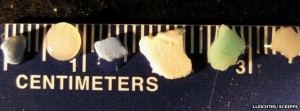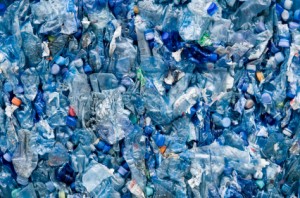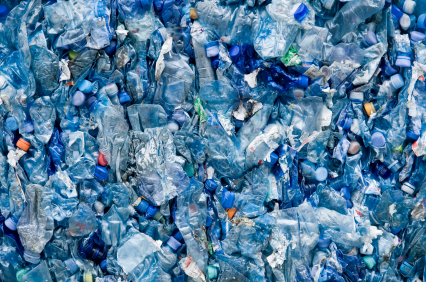In the November issue of Discover you can read 20 Things You Didn’t Know About Plastic. Here are some interesting facts you probably didn’t know:
- We humans consume almost 273 billion kilograms (600 billion pounds) globally every year.
- Our plastic consumption continues to increase at a rate of 5% per year.
- In the U.S. alone we consumed 102 billion plastic bags in 2009.
- U.S. landfill adds 31 million tons of plastic waste annually.
- NOAA, the National Ocean Atmospheric Administration, estimates that our ocean surfaces are being contaminated by 13,000 pieces of plastic litter per square kilometer. That includes a range of plastic from degraded at the microscopic level to large rafts of floating plastic debris.
Plastic is durable and versatile. We can mold it into almost any shape. We can reuse some of it to make new plastic items. But what we can’t easily do is decompose it. That’s because plastic is a polymer, consisting of hundreds of thousands of smaller molecular units called monomers. Polymers are huge molecular structures that can stretch and bend. But don’t ask a microbe to digest a polymer. The molecules are just too big to be handled. Plastic thrown in landfill, therefore, doesn’t degrade.
It appears that the only way to breakdown plastic is through chemical processes. Sunlight and heat seem to work. The photochemical effect from sunlight doesn’t work on all plastics and as the polymer degrades it turns into brittle fragments that keep getting smaller until they become microscopic. The process can take years.

On the other hand heat seems to work well on plastic. Cook it and you can break down the polymer chains. A Markham, Ontario company, Phoenix Depot International, is one of a handful of technology developers that are using a heat-based process to take waste plastic from recycling programs and landfill and convert it into clean diesel and gasoline fuel. The technology, called Thermal Molecular Decomposition (TMD) involves raising the temperature of the plastic to 700 Celsius (almost 1,300 Fahrenheit) at atmospheric pressure in an oxygen-free environment. There is no combustion, no toxic waste gases and no secondary contamination. The process yields gasoline, diesel fuel and carbon black.
The TMD technology can also be used to turn scrap tires and waste oil into usable clean fuels. Every landfill can become its own fuel depot processing plastic, tires and waste oil into gasoline and diesel. Output is impressive:
- 5 tons of plastic waste converts to 2,557 liters of diesel and 1,193 liters of gasoline
- 5 tons of waste tires converts to 2,046 liters of diesel and 955 liters of gasoline
- Both produce less than a half ton of carbon black which has its own commercial market
The TMD technology is available in 5, 30 and 50-ton units to scale to any operational requirement.
Phoenix is not alone in attempting to solve the waste plastic issue. I have found a number of other companies including:
- Poly-Green Technology and Resources, a company in early stage start up in the Philippines
- Cynar, in Dublin, Eire, with 10 plants planned for the United Kingdom
- Agilyx, in Portland, Oregon, capable of converting plastic to oil which then can be sent to refineries for further processing
- Xinxiang Doing, in Henan, China, using pyrolysis to create fuel oil, gas and carbon black from plastic and waste tires
- Envion, in Washington, DC, using thermal cracking to create crude oil from plastic
- Sundrop Fuels, in Longmont, Colorado, creating biofuel from biomass using a high temperature gasifier
- Klean Industries, in Vancouver, British Columbia, converting waste tires and plastic to oil, syngas and charcoal
- Plastic2Oil, in Thorold, Ontario, converting plastic to diesel, furnace oil, bunker fuel, naphtha and carbon black
As long as we continue to be a throw away society particularly with plastic, it’s good to know that there are companies addressing the waste we produce and coming up with ways to remove it from landfill without further polluting the environment. That’s a good first step in tackling the plastic problem we created over the last 70 years.











Plastic solutions:
Build whole planes or cars from them.
a House, cabin.
Houseboat
shelter prefab mobile
make into bricks?
pour into roadways.
biosuits
Biomed devices.
Fuel for cars, planes?
Domed enclosures
Undersea Habitat modules.
& more with
80% recycled plastics. worldwide
Plastic can be repurposed. Venezuela is building houses from plastic, but not the recycled type. There is no doubt polymers have many applications we have yet to exploit. You should expand on these ideas.
It is amazing to hear that technologies are now using the technique of converting plastics into diesel that can be useful for us. Plastics can be found everywhere and also can cause pollution by these projects it can be lessen and turning it to be useful one.